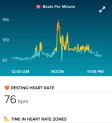Fitness trackers are helpful for monitoring exercise activity, but the data could also be used to make important emergency medical decisions. It helped a set of South Jersey doctors do just that.
A 42-year-old New Jersey man wound up in Camden's Our Lady of Lourdes emergency room recently with an irregularly fast heartbeat, called atrial fibrillation, after having a seizure. Atrial fibrillation's can be chronic, but they can also be triggered by seizures and the doctors treating the man were unsure when it started.
During his work-up, doctors noticed he was wearing a fitness tracker, a Fitbit Charge HR, and they asked to see if the device recorded a change in his heartbeat. Looking at the data on the man's smartphone, doctors confirmed that the atrial fibrillation began with the seizure.

The information helped the physicians decide to perform electrical cardioversion on the man's heart — that's when an electrical current is used to reset a person's heart to a normal rhythm.
Without the data from the man's Fitbit, electro cardioversion would have been very risky with the possibility of death, if the man's heart stopped.
The man's doctors believe this is the first time that information from an activity tracker was used to make a medical decision beyond monitoring a person's weight. They published the man's case in the April issue of the Annals of Emergency Medicine.

